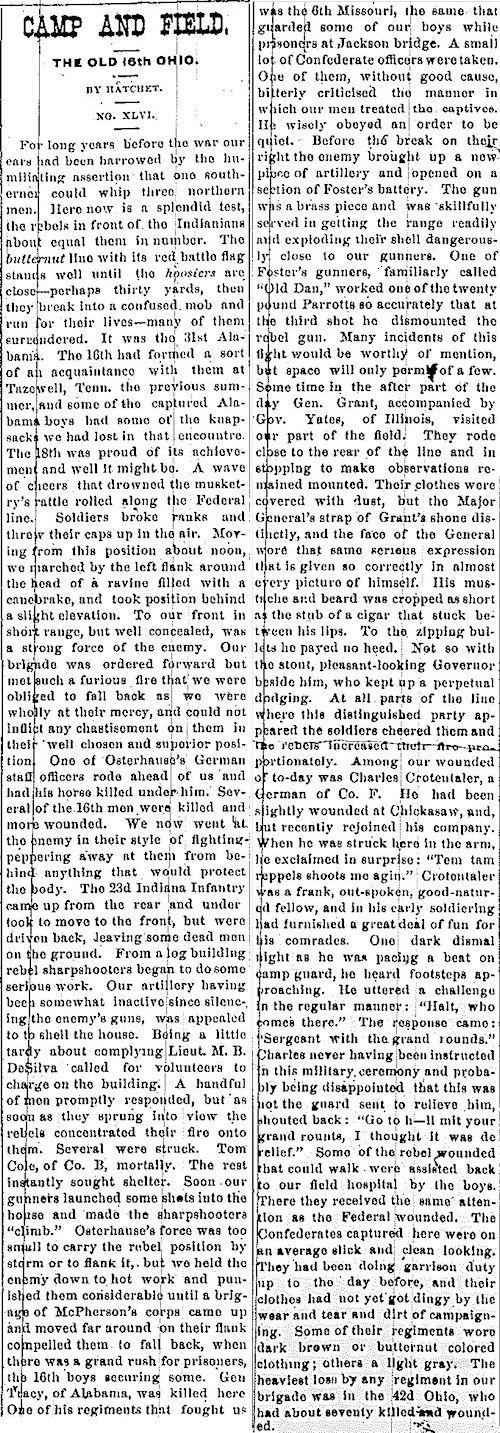| Camp & Field Chapter 45 | Camp & Field Index Page | 16th OVI Home Page | Camp & Field Chapter 47 |
The Camp & FieldArticles by Theodore Wolbach |
 Cpl. Theodore D. Wolbach |
The following image represents one of a series of articles written by Cpl. Theodore D. Wolbach, Company E, titled "Camp and Field" and published, by chapter, in the Holmes County Republican newspaper from February 24, 1881 to August 17, 1882. The articles tell the story, in great detail and color, of the 16th OVI, from the inception of the 3-year regiment in October, 1861, through all its camps, battles and marches until it was disbanded on October 31, 1864. The first 35 chapters, also presented on these pages, were obtained from a book in which the articles, clipped from the newspaper, had been pasted over the pages, believed to have been done by a descendant of Capt. Rezin Vorhes, Company H. All the remaining chapters (36 through 78), except chapter 60, were recently found in a Holmes County library by researcher Rob Garber who obtained copies, performed the transcriptions and provided to this website and which are also presented here, thus providing the complete work by Theodore Wolbach.
Throughout these articles click on the underlined white text for additional details.
The webauthor thanks 16th Ohio descendant Rob Garber for his excellent research on the Camp And Field articles and for performing the tedious digital transcription of those articles found on each page. The transcriptions were made to reflect the original articles verbatim, misspellings and all. Rob is the 3rd great nephew of Capt. William Buchanan, Company F, 16th Ohio, who served in the 90-day regiment as a private, re-enlisting in the three year regiment, and eventually making the rank of Captain of Company F. Thanks Rob!
Chapter 46 - May, 1863
 |
Published in Holmes County Republican XLVI. For long years before the war our ears had been harrowed by the humiliating assertion that one southerner could whip three northern men. Here now is a splendid test, the rebels in front of the Indianians about equal them in number. The butternut line with its red battle flag stands well until the hoosiers are close--perhaps thirty yards, then they break into a confused mob and run for their lives--many of them surrendered. It was the 31st Alabama. The 16th had formed a sort of an acquaintance with them at Tazewell, Tenn. The previous summer, and some of the captured Alabama boys had some of the knapsacks we had lost in that encountre [sic]. The 18th was proud of its achievement and well it might be. A wave of cheers that drowned the musketry's rattle rolled along the Federal line. Soldiers broke ranks and threw their caps up in the air. Moving from this position about noon, we marched by the left flank around the head of a ravine filled with a canebrake, and took position behind a slight elevation. To our front in short range, but well concealed, was a strong force of the enemy. Our brigade was ordered forward but met such a furious fire that we were obliged to fall back as we were wholly at their mercy, and could not inflict any chastisement on them in their well chosen and superior position. One of Osterhaus's German staff officers rode ahead of us and had his horse killed under him. Several of the 16th men were killed and more wounded. We now went at the enemy in their style of fighting peppering away at them from behind anything that would protect the body. The 23d Indiana Infantry came up from the rear and under took to move to the front, but were driven back, leaving some dead men on the ground. From a log building rebel sharpshooters began to do some serious work. Our artillery having been somewhat inactive since silencing the enemy's guns, was appealed to to shell the house. Being a little tardy about complying Lieut. M.B. DeSilva called for volunteers to charge on the building. A handful of men promptly responded, but as soon as they sprung into view the rebels concentrated their fire onto them. Several were struck. Tom Cole, of Co. B, mortally. The rest instantly sought shelter. Soon our gunners launched some shots into the house and made the sharpshooters |
was the 6th Missouri, the same that guarded some of our boys while prisoners at Jackson bridge. A small lot of Confederate officers were taken. One of them, without good cause, bitterly criticised the manner in which our men treated the captive. He wisely obeyed an order to be quiet. Before the break on their right the enemy brought up a new piece of artillery and opened on a section of Foster's battery. The gun was a brass piece and was skillfully served in getting the range readily and exploding their shell dangerously close to our gunners. One of Foster's gunners, familiarly called |
| Camp & Field Chapter 45 | Camp & Field Index Page | 16th OVI Home Page | Camp & Field Chapter 47 |